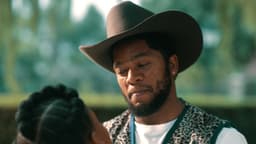
Imibuzo episode 9 recap: Lindokuhle Cele stolen by hate crime
On 6 February 2020, Mvuyisi Noguda (30) attacked musician and LGBTQIA+ activist Lindokuhle Cele (23) outside a butchery in uMlazi. Onlookers froze in terror while Lindokuhle cried out for help as Mvuyisi stabbed him 21 times in the face, chest and head.
Lindokuhle later died of his wounds in hospital and Mvuyisi was arrested, appearing in the uMlazi Magistrates court on 10 February 2020. He pleaded guilty during the trial and was sentenced to 25 years in prison at the Durban High Court on Tuesday, 3 March 2021. Judge Narini Hiralall called the crime a “hateful and savage attack,” and concluded that Mvuyisi Noguda had acted out of hatred and prejudice against Lindokuhle as a gay man.
Now Imibuzo opens the floor for Lindokuhle’s friends and family – including Lindo's grandmother Agnes Cele, AFDA lecturer and former student Musa Shozi, fellow student Nokuthula Dlamini, and AFDA lecturer Sthembile Joyful Gumede – to remember him with love.
Reporter Orrin Singh and Brian Sibeko Ngidi – director of Pietermaritzburg-based LGBTQIA+ organisation Uthingo Network – talk about how intolerance and disrespect at the highest levels places knives in killers’ hands.
- Recap: What happened in Imibuzo episode 1
- Recap: What happened in Imibuzo episode 2
- Recap: What happened in Imibuzo episode 3
- Recap: What happened in Imibuzo episode 4
- Recap: What happened in Imibuzo episode 5
- Recap: What happened in Imibuzo episode 6
- Recap: What happened in Imibuzo episode 7
- Recap: What happened in Imibuzo episode 8
Watch the trailer for Imibuzo
Lindokuhle: a sun and a star

Lindokuhle’s friends vividly remember his presence. They describe a person who spread joy and laughter, who welcomed strangers, and uplifted everyone as he buzzed with the sheer pleasure of living.
Lindokuhle's friend Nokuthula Dlamini, who joined performing arts college AFDA in 2015, remembers their first meeting clearly. "Back then I had a whole lot of hair. I had long hair and he loved it. So, because of the person that he was, he would just run up to me and be like, 'Oh, my friend, so much hair? How did you grow so much hair? Why is your hair like this? Oh, my gosh it's so beautiful!' And he would compliment me almost all the time. It allowed me to come out of my shell, because I was quite shy back then. And that's how we grew closer."
AFDA lecturer and former student Musa Shozi says, "I met Lindo here at AFDA. He was one of the first few people that I met that actually made an impression. The first time I came to AFDA I was asked to perform so, when everyone came in and saw me, I was topless and getting ready to dance. And Lindo, being the person he is, made a funny comment towards me, and we laughed about it. That's how I met him."
It was a friendship to treasure. "When he walked into a room, you felt him, besides hearing him. Whenever he walked into a room, he would make it known that, yep, Lindo had arrived. He would either be singing, or he would make a funny comment, or he'd be dancing," says Musa. "This is someone who is not afraid to express themselves in any way that they wanted to. He was easy to get along with, very funny and very open about everything."
Nokuthula agrees. “He was so loving, caring, and so happy. He was genuinely a happy person. There was never a day when I saw him to be sad, frustrated or angry. He always exuded happiness at all times. That was something amazing. He performed everything. He would sing to you as an answer. He would burst out into song. He would strut across the hall at school. He would act. He was someone who wanted to tell a story some way or another. He was a superstar.”
Lindokuhle was as determined as he was kind, throwing his heart and soul into his music studies. AFDA lecturer and performer Sthembile Joyful Gumede remembers, “He was very involved with the classes. Songwriting was one of his strongest suits. We will never truly know what he has experienced in his own personal space. But I think him just randomly going to a person that he didn’t know to try and cheer them up already gave you an idea of his personality. A lot of that also came through in his music and his performances. He would say little comments in between, words of encouragement and positivity. His music spoke about embracing the community, and being more of a diverse community."
Lindo, as his family called him, was determined to make something of his life and raise his family and community up with him. "Lindo said to my sister, '2020 is going to be this family's year’. He said we were going to be rich. He said he had gotten a job. He would soon start working. He went out soon after saying we would be rich. He further said, 'You will appear in newspapers and TV because of me,’" reveals Lindo’s grandmother, Agnes Cele.
Lindo was right, Just not the way anyone would have wanted.
I’ll just do me

Lindokuhle advocated not just for himself as a gay man, but for everyone he saw being marginalised. “He was a huge advocate for diversity, for loving a person that you do not know, for embracing them, and also a huge advocate for expression, without anyone pressuring you or making you into something that you're not,” says Sthembile.
Nokuthula adds, “Lindo would always advocate for the LGBTQIA+ community. He wouldn't back down if someone showed that they are homophobic or they are against this community.”
And Musa remembers, "He wore that badge with pride and with everything that was in him. You would see him, and you would know that this person is very passionate about equal rights, and not being discriminated against in anything, not just the LGBTQIA+ community, but anything that had to do with discrimination, he would fight for you and he would be very vocal about it. He didn’t want any sort of discrimination or bullying.”
These were values and lessons that Lindo learned at home, where he was loved, accepted and understood. Agnes remembers, “Lindo was a child that was born and we thought was male. As time went by, as his parents, we realised the kind of child he truly is. He was two years old when we first noticed this. Lindo's mother worked at a clothing store. Whenever the store needed to shoot adverts, the staff's children would be asked to come and pick out what they would wear. Whenever Lindo went there, he would pick out girls' clothing and wear that. Whenever they also played pretend play, Lindo would pretend to be a woman. His mother just had to accept that, never mind his genitals, Lindo wasn't who she thought he was. As his parents, we accepted who he truly was, because we realised that he didn't change as he grew older. That's how he grew up," she insists. Lindo’s gender expression didn’t affect his basic, traditional values. Agnes remembers Lindo as a respectful, well-mannered child. And his loss is an ongoing source of pain. "When we think of him and his sense of humour, we aren't okay," she admits.
An atmosphere of intolerance

While Lindo was cherished at home and at college, his outspoken advocacy meant sticking his neck out in his larger uMlazi neighbourhood. Every day living as an openly gay man was an act of extraordinary courage.
Lindo’s friend Musa recalls, “He would never hide who he was for anyone. Lindo did talk about experiencing difficulty being a young, gay, black man in uMlazi. Somehow within the darkness that's around the topic he would try to find light and humour in it. But he would talk about discrimination. He would talk about the hate comments, the vulgarity, and people being uncomfortable … being from uMlazi it’s a grim horror that we have to face and know that it’s actually there."
Nokuthula Dlamini adds, “Because of people like Lindo, there are people who are working towards breaking these stereotypes, and breaking that discrimination against them, so you wouldn't have a situation where someone's home is being burnt because they are gay or anything like that. But you would get those harsh comments, those terrible remarks that you would get on the street. about a certain person because of their sexuality.”
Brian Sibeko Ngidi, director of Pietermaritzburg-based LGBTQIA+ organisation Uthingo Network, reveals that a lot still needs to be done before South Africa aligns with its own constitution. And that means holding everyone who spreads hate speech accountable.
"We focus on advocacy efforts in rural communities of KwaZulu-Natal. There's so much work to be done. If you look at KZN, it has so much influence from culture and religion. And with the late Zulu king being so influential and being anti-LGBTQIA+ rights and being queer-phobic and transphobic, rigid anti-LGBTQIA+ social sentiments and norms still exist and inform people's negative attitudes towards LGBTQIA+ people,” says Brian.
Brian explains that hate crimes represent efforts from people who want to feel powerful, to control anyone who challenges the social structures that they believe gives them power. "Research, personal experience and evidence actually suggest to us that hate crimes are perpetrated by people who hold rigid social norms. For example, people who feel like they are the gatekeepers of culture, religion and tradition. People who feel more powerful than their victims. And if the community members do not conform to what society or culture prescribes how a man has to behave or how a man has to look like, then they take it into their own hand to force them to conform. And they force them in a number of ways. It could be violence. It could be hate speech. People, community members, take it upon themselves to violate LGBTQIA+ people because they want them to conform to societal norm.”
A hate crime

While Lindokuhle’s killer held the knife, his society told him who to attack. Reporter Orrin Singh reveals, “Lindokuhle had been at the butchery in uMlazi K-section, and Mvuyisi had come through in a taxi. From what we understand, Mvuyisi had gone to meet a marijuana dealer. It's not known whether Mvuyisi had gone there specifically knowing that Lindokuhle was there. Mvuyisi and Lindokuhle get into this argument and Mvuyisi ends up producing a knife and stabbing him. He was stabbed multiple times. And while his aggressor was stabbing him, he was begging for his life, apologising to his attacker, although he had done nothing wrong. And this was where people started saying that he was murdered just for being homosexual.”
A community speaks out

Reporter Orrin Singh reveals that when police first sent out press releases about Lindo’s murder, there was no mention of it being a violent hate crime. “It was a standard press release by the police. For them to issue a press release that a 23-year-old male was stabbed to death at a butchery in uMlazi was nothing out of the ordinary,” he admits. “We would receive about 15-16 press releases a week of similar circumstances, where someone was killed for no apparent reason.”
Then Lindo’s community took to social media. “The community adored Lindo very much. They never ostracised him. His passing and the way in which he passed on didn't sit well with them," says Agnes. "They were upset that he was murdered because he was gay.”
And according to Orrin, the public outcry made sure that the case got the justice system’s full attention. “This was really integral and important for the case to go forward. A lot of people in the LGBTQIA+ community started reaching out to us as journalists, and also taking to social media and punting Lindokuhle’s case, saying this cannot fall on deaf ears. It was really important that Lindokuhle’s family and friends got active in this case … making their presence felt, making sure that this case didn’t go away and just fall underneath the carpet.”
“Life” for a life

Lindo’s friends and family still remember the day of his death with shock, disbelief and pain. “How could such a horrific crime happen where we grew up?” asks Musa.
As such, while the 25-year sentence handed down to Mvuyisi Noguda was a start, it can’t bring back the light in their lives. And from what friends and family saw in court, Mvuyisi Noguda felt no remorse for what he’d done to Lindo, and what he’d taken from them.
"The perpetrator was sentenced, but we were still hurt," says Agnes. "I don't know what a befitting sentence would be ... My child will never see another day. It was painful to watch because the perpetrator had no remorse. It's as if he slaughtered a mere chicken. He didn’t care. He didn’t care at all. We walked out of the courtroom crying.”
"I'm not happy with the sentence he received ... but it's an example to others not to do what that man did to my friend,” says Nokuthula. “What I felt towards the killer at that time was utter disgust. There was absolutely no reason for him to do that to Lindo. We will never get our friend back, no matter what happens. We've lost a star … The last conversation I had with Lindo was a conversation of affirmations. The last thing we said to each other was, ‘Just keep shining, superstar,’” Nokuthula remembers.
About Imibuzo
Now streaming on Showmax, Imibuzo is a true-crime documentary anthology that will answer your lingering questions about some of South Africa’s biggest news stories from the last decade. Season 1’s final episode will air on Monday, 10 July 2023.
Imibuzo is produced by POP24, part of Media24, who made the reality series This Body Works For Me, which topped the Showmax Top 20 and Twitter trends charts. POP24 also co-produced the SAFTA-nominated true crime anthology Huisgenoot: Ware Lewensdramas.
Watch Imibuzo now on Showmax.
More like this

South Africa’s stories and storytellers recognised as SAFTA nominees announced
Mzansi’s boldest stories take centre stage as the 2026 SAFTA nominees are unveiled, with a wave of nominations across DStv and Showmax.

Billy Joel: And So It Goes (2025)
An honest, insightful, and deeply moving look at the life and career of acclaimed musician Billy Joel, covering both his struggles and triumphs.

Surviving Mormonism with Heather Gay S1
Former RHOSLC cast member Heather Gay investigates hidden truths within the Mormon church, exposing cracks in its perfect facade.

Brakpan Chronicles: Die mense sê, kom in
The two-part documentary series Brakpan Chronicles, by Rian van Heerden and Provoco, will premiere soon on Showmax.

Wizkid: Long Live Lagos (2025)
This intimate and uplifting documentary explores Grammy-winning Nigerian artist Wizkid's rise to superstardom as one of the biggest Afrobeats artists.

Law & Order Toronto: Criminal Intent S1-2
This spin-off of the hit crime drama franchise follows an elite squad investigating corruption and high-level white-collar crime in Greater Toronto.

Helderberg S1
South Africa suffered its worst air disaster in 1987. The hunt for the truth about what happened to SAA Flight 295 is still on almost 40 years later.

Masinga - The Calling (2024)
Inspector Masinga is dispatched back to Africa on a sex-trafficking case, and once he's home, he tries to find justice for the killing of his brother.
Outlaws, now streaming on Showmax
Go on holiday with RHUGT: Africa
More eye-opening documentaries

Jojo on The Real Housewives Ultimate Girls Trip: Africa reunion, social media backlash and more
Jojo opens up about the highly anticipated reunion for The Real Housewives Ultimate Girls Trip: Africa, coming to Showmax on 20 and 27 February.

South Africa’s stories and storytellers recognised as SAFTA nominees announced
Mzansi’s boldest stories take centre stage as the 2026 SAFTA nominees are unveiled, with a wave of nominations across DStv and Showmax.

Billy Joel: And So It Goes (2025)
An honest, insightful, and deeply moving look at the life and career of acclaimed musician Billy Joel, covering both his struggles and triumphs.

Surviving Mormonism with Heather Gay S1
Former RHOSLC cast member Heather Gay investigates hidden truths within the Mormon church, exposing cracks in its perfect facade.
Latest Stories

Schalk Bezuidenhout trades stand-up for 9-5 in Die Kantoor

A heartbreaking loss: Nolwandle Biyela’s final stand in Outlaws Season 2

Fall in love with romantic drama Touch, now on Showmax

Antonie Marx on Volspoed and why it's a must-watch

Sandra Stein makes her debut on Law, Love and Betrayal S2

Albert Pretorius on Die Kantoor, SA’s re-imagining of The Office

20+ addictive South African reality shows to stream

Where to watch The Real Housewives franchise online

How to Train Your Dragon: Bringing Hiccup and Astrid to life

What to watch on Showmax in January 2026

7 things to know about indie award-winning movie Dìdi

Mission: Impossible – The Final Reckoning’s South African stunts

Die Kwiksilwers (2024)

Where to see the cast of Mpondoland on Showmax

Angel on The Real Housewives Ultimate Girls Trip, Jojo and more

Thandolwethu Zondi on his new role in Outlaws S2
Must-watch trailer for Showmax's turbo-charged reality series Volspoed

The Real Housewives Ultimate Girls Trip cast on first impressions, beefs and more

Fana Mokoena on playing a sangoma in Masinga

Princess Jecoco on The Real Housewives Ultimate Girls Trip Africa

Tlali returns: Outlaws’ most loved and hated villain is back

Novocaine: the US box office hit shot in Cape Town

Why Jackie Phamotse says Slay Queens is a must-watch

Evodia on Ultimate Girls Trip Africa and her return to reality TV







